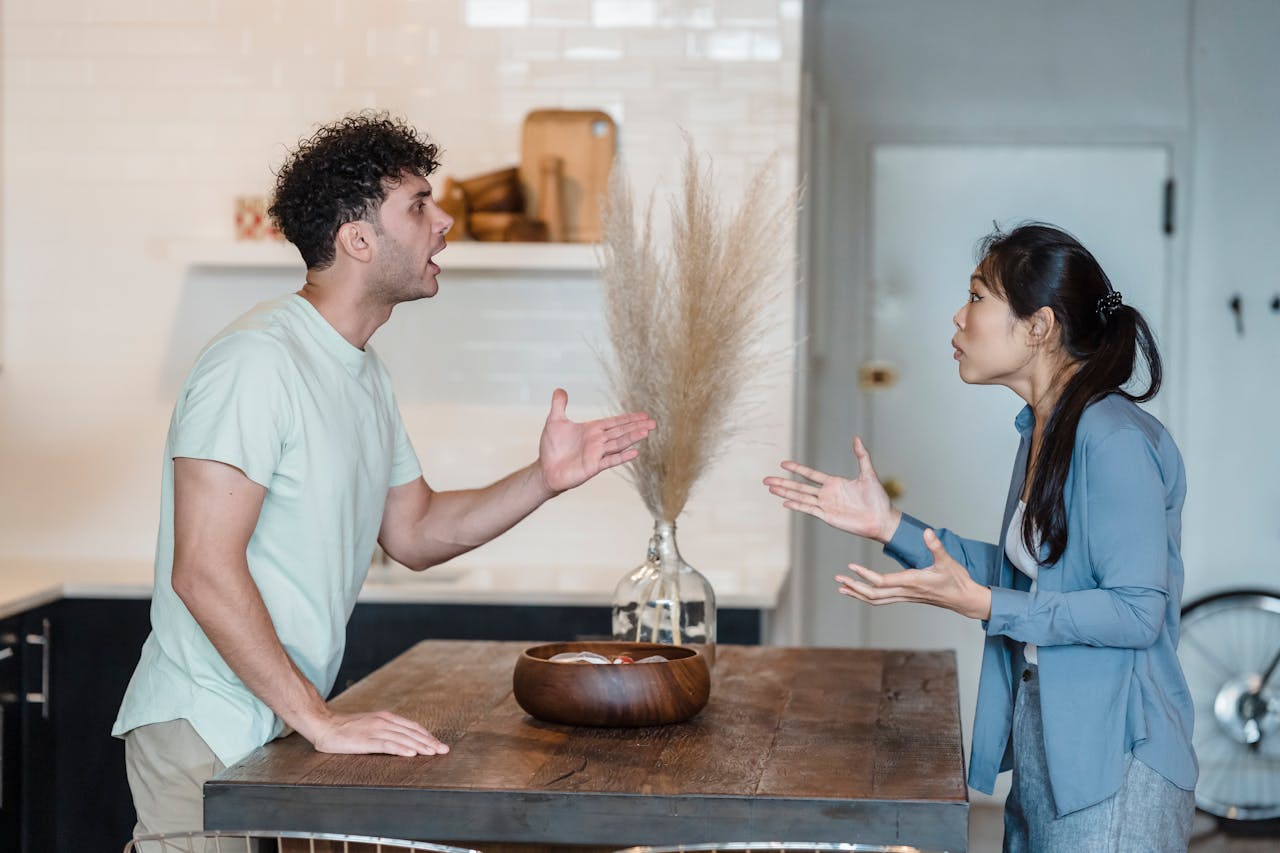
Hay dos cuestiones que me parecen fundamentales de distinguir. Estas son: la relación de pareja enfocada desde la perspectiva del crecimiento, y las negociaciones de poder dentro de la pareja. Según mis observaciones, y tras escuchar numerosas narrativas, el segundo aspecto es el más frecuente. Son relaciones que giran en torno al mantenimiento de intereses materiales ("tanto tienes tú y tanto tengo yo"). Si se comparte, no es para crear un vínculo de crecimiento basado en una sinergia positiva de apoyo mutuo incondicional, sino por lo que yo poseo y te ofrezco. Es como si se intentara subsumir a la otra persona, de forma continua, para que esté a la entera disposición de los recursos propios, bajo la premisa de que "si creces o mejoras, es gracias a lo que yo tengo".
 [](https://pixabay.com/es/photos/enojar-la-impotencia-2728273/)
[](https://pixabay.com/es/photos/enojar-la-impotencia-2728273/)
>! [English version ]
>There are two issues that I believe are fundamental to distinguish. These are: the relationship between partners focused on growth, and power negotiations within the couple. According to my observations, and after listening to numerous narratives, the second aspect is the most common. These are relationships that revolve around the maintenance of material interests (“you have this much and I have that much”). If there is sharing, it is not to create a bond of growth based on a positive synergy of unconditional mutual support, but rather because of what I possess and offer you. It is as if one were trying to continually subsumes the other person so that they are entirely at the disposal of one's own resources, under the premise that “if you grow or improve, it is thanks to what I have.”
 [](https://pixabay.com/es/photos/enojar-la-impotencia-2728273/)
[](https://pixabay.com/es/photos/enojar-la-impotencia-2728273/)
Algunos de estos vínculos son de antaño, otros apenas germinan. Por lo general, muchas de esas personas piensan en la independencia económica, en buscar posibilidades mediante iniciativas individuales más allá de esa relación y que a menudo les cuesta iniciar. Pero el trasfondo es el hecho de que esa relación les ha ocasionado también insatisfacciones de diferentes tipos, que les hacen perder la esperanza de seguir sosteniendo el vínculo o de encontrar oportunidades de relaciones más sanas. Sin embargo, lo que tiene más peso es el hecho de independizarse económicamente.
Imagino lo doloroso que debe ser vivir tantos años con la misma persona, y un día amanecer pensando en esa independencia, porque el vínculo que se había nutrido no estaba enfocado en el crecimiento, sino basado enteramente en una lógica transaccional.
>! [English version ]
>Some of these bonds are long-standing, others are just beginning to form. In general, many of these people think about financial independence, about seeking opportunities through individual initiatives beyond that relationship, which they often find difficult to initiate. But the underlying factor is the fact that this relationship has also caused them various types of dissatisfaction, causing them to lose hope of continuing the bond or finding opportunities for healthier relationships. However, what carries the most weight is the desire to become financially independent.
>I can imagine how painful it must be to live with the same person for so many years and then wake up one day thinking about that independence, because the bond that had been nurtured was not focused on growth, but based entirely on a transactional logic.
 [](https://www.pexels.com/photo/woman-in-white-dress-shirt-sitting-beside-woman-in-white-long-sleeve-shirt-4098219/)
[](https://www.pexels.com/photo/woman-in-white-dress-shirt-sitting-beside-woman-in-white-long-sleeve-shirt-4098219/)
>I can imagine how painful it must be to live with the same person for so many years and then wake up one day thinking about that independence, because the bond that had been nurtured was not focused on growth, but based entirely on a transactional logic.
 [](https://www.pexels.com/photo/woman-in-white-dress-shirt-sitting-beside-woman-in-white-long-sleeve-shirt-4098219/)
[](https://www.pexels.com/photo/woman-in-white-dress-shirt-sitting-beside-woman-in-white-long-sleeve-shirt-4098219/)
Para comprender mejor esta situación, se manifiestan dos factores: el miedo a vivir solo y la presión del status quo. Muchas personas consideran que el hecho de vivir solas, sin alguien a su lado, les puede resultar muy doloroso. Por supuesto, nuestra necesidad de crear vínculos es natural; lo hacemos desde nuestro primer llanto. Pero a medida que crecemos podemos establecer toda clase de vínculos y valorarlos según nuestras preferencias o elecciones. Podemos elegir quiénes serán nuestros amigos y elegir a la persona con quien tener hijos o formar una familia. Pero, a través de diversas anécdotas, he llegado a la conclusión de que mayormente se trata de entre el miedo a vivir solo y la presión familiar o social de mantener el status quo; es decir, de permanecer en una relación que no funciona y que se sostiene por el tan temido “qué dirán”, o, en su defecto, en una dinámica de "tanto doy, tanto recibo", donde el crecimiento personal del otro, o incluso el propio, queda supeditado a ese balance de poder.
>! [English version]
>To better understand this situation, two factors come into play: the fear of living alone and the pressure of the status quo. Many people believe that living alone, without someone by their side, can be very painful. Of course, our need to form bonds is natural; we do so from our first cry. But as we grow up, we can establish all kinds of bonds and value them according to our preferences or choices. We can choose who our friends will be and choose the person with whom we will have children or start a family. But, through various anecdotes, I have come to the conclusion that it is mostly a matter of the fear of living alone and family or social pressure to maintain the status quo; that is, to remain in a relationship that does not work and is sustained by the much-feared “what will people say,” or, failing that, in a dynamic of “I give so much, I receive so much,” where the personal growth of the other, or even one's own, is subordinated to that balance of power.
 [](https://www.pexels.com/photo/a-couple-talking-while-arguing-8560383/)
[](https://www.pexels.com/photo/a-couple-talking-while-arguing-8560383/)
 [](https://www.pexels.com/photo/a-couple-talking-while-arguing-8560383/)
[](https://www.pexels.com/photo/a-couple-talking-while-arguing-8560383/)
Dar el primer paso para construir vínculos hacia el crecimiento en pareja, más allá de la transacción de recursos o dinámicas de poder, es una alternativa real, reconociendo que es difícil de llevar, sobre todo cuando se desarrolla un apego tan fuerte o una costumbre tan arraigada a la otra persona, que su ausencia de nuestras vidas o la disolución de ese “nosotros” que se fue construyendo por años, se empieza a desvanecer lentamente, entre dudas e inseguridades, haciendo que nos cueste muchísimo soltar esa seguridad que nos da lo conocido, aunque en el fondo sepamos que una relación donde crezcamos juntos nos haría sentir mucho más completos y felices a largo plazo. Una vez más, nos encontramos nuevamente en una encrucijada, tal como lo abordé en mi publicación anterior.
Lo que late el corazón, se silencia ante la fría razón del poder.
>! [English version ]
>Taking the first step to build bonds for growth as a couple, beyond the transaction of resources or power dynamics, is a real alternative, recognizing that it is difficult to carry out, especially when such a strong attachment or noticeable habit of the other person develops that their absence from our lives or from that “us” that has been built over years begins to slowly fade away like a flame, amid doubts and insecurities, making it very difficult for us to let go of the security that comes with the familiar, even though deep down we know that a relationship where we grow together would make us feel much more complete and happy in the long run. Once again, we find ourselves at the same crossroads as always, as I discussed in my previous post.
https://www.youtube.com/watch?v=tusB4n_9GpQ
---
##### Text translated to english with [DeepL](https://www.deepl.com/translator)
What the heart beats for is silenced by the cold reason of power.
---Hereafter - Dissonance
#spanish
#bienestar
#reflection
#love
#relationships
Payout: 0.000 HBD
Votes: 140
More interactions (upvote, reblog, reply) coming soon.